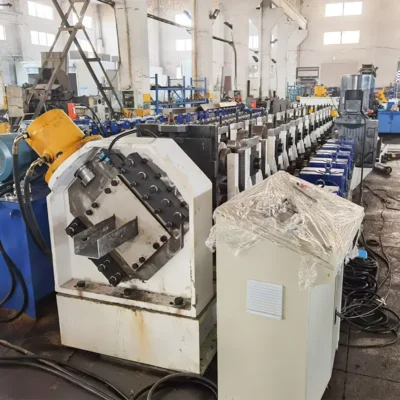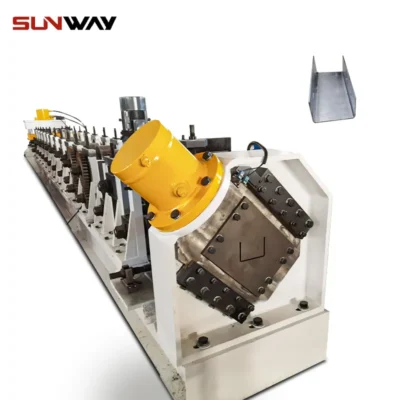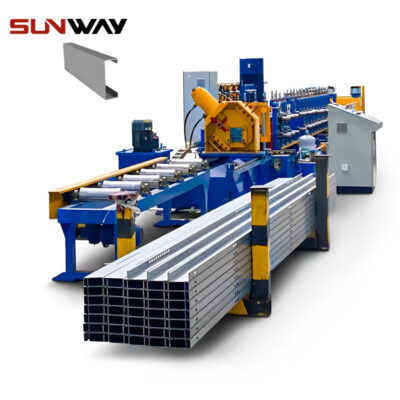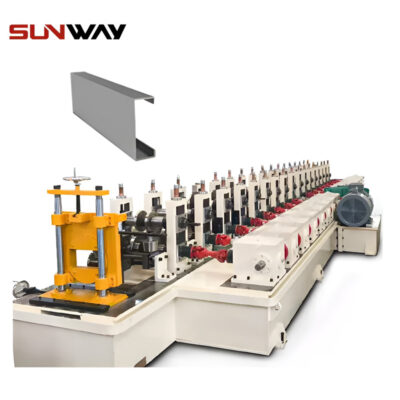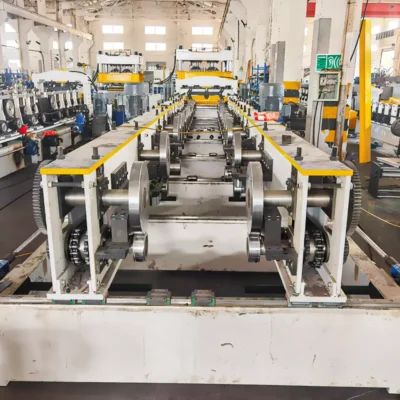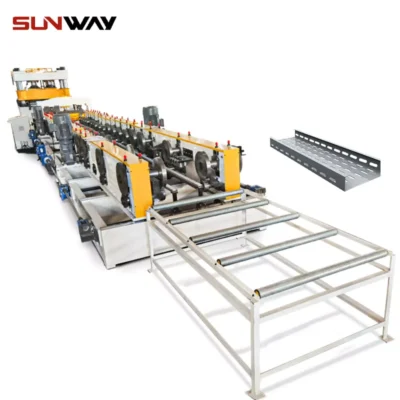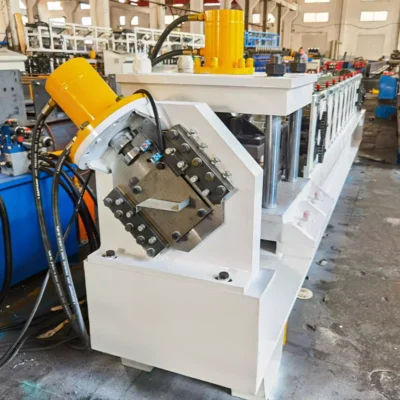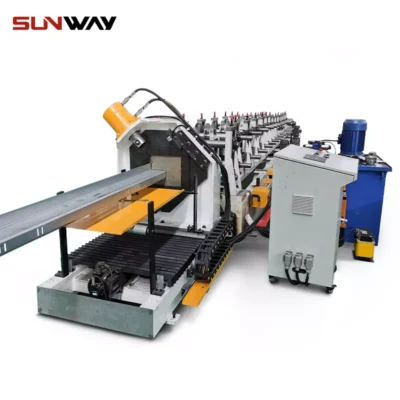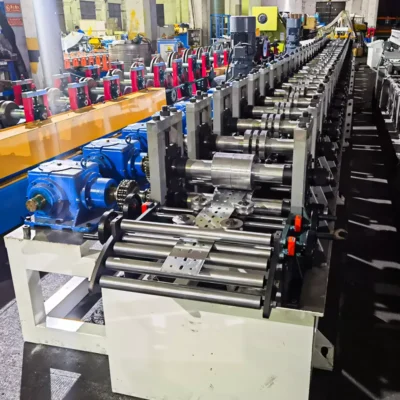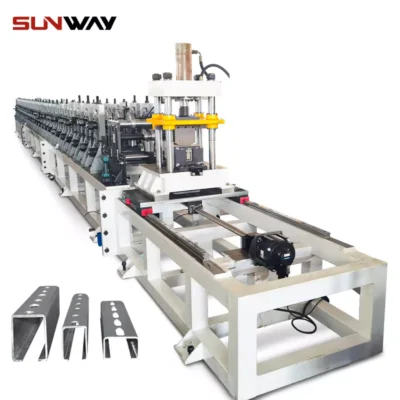In the food processing and packaging industries, precision, hygiene, and durability are non-negotiable. To meet the stringent requirements for food-grade components, Food Equipment Roll Forming Machines are an essential part of the manufacturing process. These machines are designed to produce high-quality metal profiles used in food equipment, addressing the unique challenges of food safety, sanitation, and efficiency in production.
In this article, we’ll explore what food equipment roll forming machines are, their applications, key features, pricing, automation capabilities, advantages over traditional manufacturing methods, and why Wuxi Sunway Machinery is a trusted global leader in this industry. Whether you are a food equipment manufacturer or someone interested in innovative manufacturing technologies, this guide will give you the insights you need.
What Are Food Equipment Roll Forming Machines?
Food Equipment Roll Forming Machines are specialized machines used to produce metal components and profiles that meet the hygiene and structural requirements of food processing and packaging equipment. These machines use cold roll-forming technology to shape stainless steel, aluminum, and other food-grade materials into precise and durable profiles.
The food industry has unique needs, including compliance with strict regulations, corrosion resistance, and seamless designs to prevent contamination. Roll-forming machines tailored for this industry ensure components are not only functional but also safe for use in food-related environments.
Key Features
- Food-Grade Material Compatibility: Processes stainless steel, aluminum, and other food-safe materials.
- High Precision: Produces components with exact dimensions to fit food equipment designs.
- Hygienic Design: Ensures smooth, seamless profiles to prevent the accumulation of bacteria or contaminants.
- Durability: Outputs corrosion-resistant components that can withstand cleaning chemicals and high temperatures.
- कस्टम प्रोफाइल: Capable of producing components tailored to specific equipment needs.
Applications of Food Equipment Roll Forming Machines
The components manufactured by Food Equipment Roll Forming Machines are used across a wide range of food processing, packaging, and storage equipment. These machines are essential for producing parts that meet the industry’s rigorous standards for hygiene, durability, and functionality.
1. Conveyor Systems
- Use Case: Manufacturing stainless steel profiles for food conveyor belts.
- Why It’s Essential: Ensures smooth surfaces for transporting food without contamination or product loss.
2. Food Storage Racks
- Use Case: Producing profiles for storage racks used in refrigerators, freezers, and warehouses.
- Why It’s Beneficial: Provides corrosion resistance and durability in temperature-controlled environments.
3. Packaging Machines
- Use Case: Crafting components for packaging machines, including sealing and cutting systems.
- Why It’s Necessary: Ensures precision and hygiene in food packaging processes.
4. Food Processing Equipment
- Use Case: Shaping profiles for mixers, grinders, and slicers used in food processing plants.
- Why It’s Unique: Delivers durable and easy-to-clean components that meet food safety standards.
5. Shelving Units
- Use Case: Producing metal profiles for shelving systems used in commercial kitchens and storage facilities.
- Why It’s Critical: Offers sturdy and hygienic solutions for food storage and organization.
6. Beverage Dispensers
- Use Case: Manufacturing components for beverage dispensers, including frames and supports.
- Why It’s Relevant: Provides corrosion resistance and seamless designs for liquid handling.
Advantages of Using Food Equipment Roll Forming Machines
The food industry demands precise and hygienic manufacturing solutions. Here’s why Food Equipment Roll Forming Machines are the preferred choice for producing food-grade components:
1. Compliance with Food Safety Standards
- Why It’s Crucial: Ensures components meet international food safety regulations, such as FDA and EU standards.
2. Precision and Consistency
- Why It’s Beneficial: Produces components with exact dimensions, ensuring a perfect fit and seamless operation.
3. Corrosion Resistance
- Why It’s Essential: Processes materials like stainless steel, which resist rust and corrosion even in harsh cleaning conditions.
4. Customization
- Why It’s Beneficial: Supports the production of unique profiles tailored to specific food equipment designs.
5. Cost-Effectiveness
- Why It’s Practical: Reduces material waste and labor costs, making high-quality components more affordable.
6. High-Speed Production
- Why It’s Relevant: Enables manufacturers to meet the industry’s demand for large-scale production without delays.
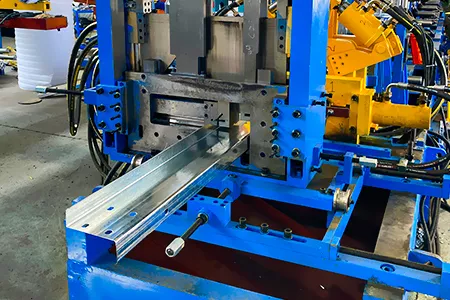
Key Features of Wuxi Sunway Food Equipment Roll Forming Machines
Wuxi Sunway Machinery is a global leader in roll-forming technology, offering machines specifically tailored to the needs of the food industry. Here’s what makes their machines stand out:
1. Food-Grade Material Compatibility
- Supported Materials:
- Stainless Steel
- एल्यूमीनियम
- गैल्वेनाइज्ड स्टील
- Why It’s Beneficial: Processes materials that meet food safety and hygiene standards, ensuring compliance with industry regulations.
2. Hygienic Profile Design
- What It Offers: Produces smooth, seamless profiles that prevent the accumulation of bacteria or contaminants.
- Why It’s Unique: Enhances food safety and simplifies the cleaning process.
3. Integrated Cutting and Punching
- What It Includes: Built-in systems for precision cutting, punching, and notching during the roll-forming process.
- Why It’s Efficient: Reduces production time and ensures components are ready for assembly.
4. Custom Tooling Options
- What It Enables: Modular tooling systems for producing diverse component profiles on a single machine.
- Why It’s Versatile: Supports the production of customized parts for various food equipment applications.
5. High-Speed Production
- What It Delivers: Machines capable of producing up to 80 meters of profiles per minute.
- Why It’s Essential: Keeps up with the high-volume demands of the food processing and packaging industries.
6. Eco-Friendly Design
- What It Includes: Energy-efficient motors, optimized workflows, and waste reduction systems.
- Why It’s Sustainable: Aligns with global efforts to minimize the environmental impact of manufacturing.
Pricing of Food Equipment Roll Forming Machines
The cost of a Food Equipment Roll Forming Machine depends on factors such as its features, production capacity, and customization options. Below is a general pricing guide for 2025:
| Machine Type | Capabilities | Price Range (USD) |
|---|---|---|
| Standard Machines | Basic profiles for food equipment | 150,000–150,000–150,000–400,000 |
| Advanced Machines | High-speed, integrated cutting and punching systems | 400,000–400,000–400,000–900,000 |
| Fully Customizable Machines | Modular tooling, food-grade material support | 900,000–900,000–900,000–2,000,000 |
For specific pricing and financing options, contact Wuxi Sunway Machinery.
Automation in Food Equipment Roll Forming Machines
Automation is revolutionizing the manufacturing of food equipment components, enhancing efficiency, precision, and compliance with hygiene standards.
1. Real-Time Defect Detection
- What It Includes: AI-powered systems that identify surface defects, dimensional errors, or misalignments in real time.
- Why It’s Valuable: Ensures that only flawless components proceed to assembly, reducing waste and rework.
2. Adaptive Material Handling
- What It Does: Automatically adjusts machine settings based on material thickness and profile requirements.
- Why It’s Beneficial: Eliminates manual adjustments, enhancing efficiency and precision.
3. Predictive Maintenance
- What It Tracks: IoT sensors monitor wear and tear on machine components and predict maintenance needs.
- Why It’s Revolutionary: Prevents unexpected downtime and extends the lifespan of the machine.
4. Multi-Profile Production
- What It Enables: Seamlessly switches between different profiles within a single production run.
- Why It’s Convenient: Supports diverse manufacturing needs without requiring additional setup time.
5. Remote Monitoring and Control
- What It Includes: Cloud-based systems for remote monitoring, troubleshooting, and control.
- Why It’s Convenient: Allows operators to oversee production from any location, ensuring maximum uptime.
FAQs About Food Equipment Roll Forming Machines
| Question | Answer |
|---|---|
| What materials can these machines process? | Stainless steel, aluminum, and galvanized steel. |
| What is the production speed? | Up to 80 meters per minute, depending on material and profile complexity. |
| Are these machines food-safe? | Yes, they are designed to process food-grade materials and produce hygienic profiles. |
| Can these machines handle custom designs? | Absolutely! Modular tooling supports bespoke profiles for diverse food equipment applications. |
| What is the price range for these machines? | Prices range from 150,000to150,000 to 150,000to2,000,000, based on features and customization. |
| Do these machines integrate with IoT systems? | Yes, IoT-enabled features allow real-time monitoring and predictive maintenance. |
Real-World Success Stories: Food Equipment Roll Forming Machines in Action
The impact of Food Equipment Roll Forming Machines on the food industry is profound. They have enabled manufacturers to meet strict food safety standards while ensuring cost-effective production. Here are some real-world examples that showcase their value.
1. Large-Scale Food Processing Plant in Europe
Client: A leading European food processing company specializing in frozen goods.
Challenge: The client needed stainless steel conveyor profiles with smooth finishes to transport raw food products.
Solution: Wuxi Sunway provided a roll-forming machine designed for food-grade stainless steel with integrated polishing features.
Outcome:
- Produced seamless profiles, ensuring hygiene and easy cleaning.
- Accelerated production timelines by 40%, enabling the company to expand its processing capacity.
- Delivered components that met EU food safety standards, enhancing the company’s reputation.
2. Commercial Kitchen Equipment Manufacturer in North America
Client: A manufacturer of industrial-grade kitchen equipment for restaurants and catering businesses.
Challenge: The client required custom profiles for shelving units, storage racks, and oven frames that could withstand high temperatures and chemical cleaning.
Solution: Wuxi Sunway supplied a machine with modular tooling to produce multiple profiles on the same line.
Outcome:
- Reduced material waste by 25%, lowering overall production costs.
- Enabled the manufacturer to offer customized solutions to their clients, boosting sales.
- Improved the durability of components, reducing warranty claims.
3. Dairy Processing Facility in Asia
Client: A dairy company producing milk, cheese, and yogurt for the Asian market.
Challenge: The client needed corrosion-resistant profiles for equipment exposed to high humidity and cleaning chemicals.
Solution: Wuxi Sunway provided a roll-forming machine optimized for aluminum profiles with anti-corrosion coatings.
Outcome:
- Extended the lifespan of equipment components by 50%, reducing maintenance costs.
- Enhanced hygiene standards, ensuring compliance with regional food safety regulations.
- Improved the efficiency of the production line, increasing output by 20%.
4. Beverage Packaging Line in South America
Client: A beverage company specializing in canned and bottled drinks.
Challenge: The company required precision-engineered profiles for packaging machines to handle high-speed operations.
Solution: Wuxi Sunway delivered a high-speed roll-forming machine with integrated cutting and punching systems.
Outcome:
- Achieved a production speed of 75 meters per minute, meeting the demands of high-volume packaging.
- Produced components with impeccable accuracy, reducing downtime caused by equipment malfunctions.
- Improved the overall efficiency of the packaging line, enabling faster delivery to market.
Troubleshooting Common Issues in Food Equipment Roll Forming Machines
Even the most advanced Food Equipment Roll Forming Machines can face operational challenges. Identifying and addressing these issues promptly is key to maintaining uninterrupted production.
1. Uneven Profiles
- Symptoms: Components have inconsistent dimensions or fail to meet design specifications.
- Penyebab Potensial:
- Misaligned rollers or worn-out tooling.
- Variations in material thickness.
- Solution:
- Regularly inspect and recalibrate rollers to ensure proper alignment.
- Use consistent, high-quality raw materials to prevent dimension discrepancies.
2. Material Feeding Problems
- Symptoms: Material jams or fails to feed smoothly into the machine.
- Penyebab Potensial:
- Incorrect feeder tension or alignment.
- Debris or foreign objects in the feed path.
- Solution:
- Adjust feeder tension to match the material specifications.
- Clean and inspect the feed path before starting production.
3. Tooling Wear and Tear
- Symptoms: Cutting and punching tools wear out quickly, leading to production delays.
- Penyebab Potensial:
- Low-grade materials causing excessive wear.
- Insufficient lubrication of moving parts.
- Solution:
- Opt for high-quality materials to reduce tool wear.
- Implement a lubrication schedule to maintain tool integrity.
4. Overheating Issues
- Symptoms: The machine operates inefficiently or shuts down unexpectedly.
- Penyebab Potensial:
- Overloaded motors running at maximum capacity for prolonged periods.
- Blocked cooling vents or inadequate airflow.
- Solution:
- Operate the machine within its recommended capacity.
- Regularly clean cooling systems and ensure proper ventilation.
5. Software Glitches
- Symptoms: The control system malfunctions or fails to execute commands.
- Penyebab Potensial:
- Outdated software or firmware.
- Faulty electrical connections.
- Solution:
- Update the software to the latest version and perform regular system checks.
- Inspect and repair electrical connections to prevent disruptions.
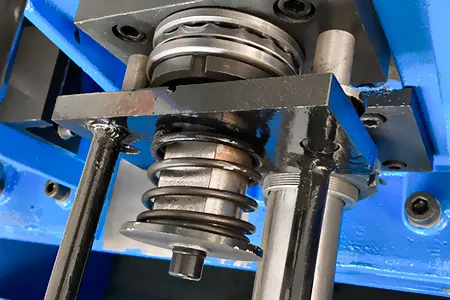
Global Market Trends for Food Equipment Roll Forming Machines in 2025
The global demand for food-grade equipment is accelerating, driven by advancements in technology, growing consumer awareness, and stricter regulatory requirements. Here are the key trends shaping the market for Food Equipment Roll Forming Machines:
1. Rising Demand for Hygienic Equipment
- Trend: Food manufacturers are prioritizing hygiene to prevent contamination and ensure safety.
- Impact: Roll-forming machines with seamless profile capabilities are in high demand.
2. Growth in Processed Food Consumption
- Trend: The global appetite for processed and packaged foods is increasing.
- Impact: High-speed roll-forming machines are essential to meet production demands.
3. Adoption of Smart Technologies
- Trend: Industry 4.0 technologies, such as IoT and AI, are being integrated into food equipment manufacturing.
- Impact: Machines with IoT-enabled features for predictive maintenance are becoming industry standards.
4. Focus on Sustainability
- Trend: Manufacturers are adopting eco-friendly practices to align with global sustainability goals.
- Impact: Machines that minimize waste and optimize material usage are gaining traction.
5. Expansion of Emerging Markets
- Trend: Developing countries in Asia, Africa, and South America are investing in food processing infrastructure.
- Impact: Affordable and scalable roll-forming solutions are crucial for these markets.
Advanced Automation Features in Food Equipment Roll Forming Machines
Automation is revolutionizing the way food equipment components are manufactured, offering unparalleled efficiency, precision, and compliance with hygiene standards.
1. AI-Powered Quality Control
- What It Includes: Artificial intelligence systems that detect defects, misalignments, and surface irregularities in real time.
- Why It’s Valuable: Ensures only flawless components proceed to assembly, reducing waste and rework.
2. Predictive Maintenance
- What It Tracks: IoT sensors monitor machine components and predict maintenance needs before failures occur.
- Why It’s Revolutionary: Prevents unexpected downtime and extends the lifespan of the machine.
3. Multi-Profile Production
- What It Enables: Seamlessly switches between different profiles within a single production run.
- Why It’s Convenient: Supports diverse manufacturing needs without additional tooling changes.
4. Adaptive Material Handling
- What It Does: Automatically adjusts machine settings based on material properties and profile designs.
- Why It’s Beneficial: Eliminates manual adjustments, saving time and improving accuracy.
5. Cloud-Based Monitoring and Control
- What It Includes: Remote access to machine data, diagnostics, and operational controls through cloud-based systems.
- Why It’s Useful: Allows operators to oversee production and troubleshoot issues from anywhere in the world.
Why Wuxi Sunway Machinery Leads the Food Equipment Manufacturing Market
Wuxi Sunway Machinery is a trusted name in the roll-forming industry, known for its innovation, quality, and customer-centric approach. Here’s why manufacturers consistently choose Wuxi Sunway for food equipment roll-forming solutions:
- Proven Industry Expertise: Decades of experience in designing roll-forming machines tailored to the food industry.
- Global Reputation: Trusted by clients in Asia, Europe, the Americas, and beyond.
- Hygiene-Centric Design: Machines prioritize food safety with seamless profile capabilities.
- Sustainability Commitment: Designs machines that align with eco-friendly manufacturing practices.
- Comprehensive Support: Offers exceptional pre-sales consultation, installation, training, and after-sales service.
Discover more about their food equipment roll-forming solutions on the official website.
FAQs About Food Equipment Roll Forming Machines
| Question | Answer |
|---|---|
| What materials can these machines process? | Stainless steel, aluminum, and galvanized steel. |
| What is the production speed? | Up to 80 meters per minute, depending on material and profile complexity. |
| Are these machines food-safe? | Yes, they are designed to process food-grade materials and produce hygienic profiles. |
| Can these machines handle custom designs? | Absolutely! Modular tooling supports bespoke profiles for diverse food equipment applications. |
| What is the price range for these machines? | Prices range from 150,000to150,000 to 150,000to2,000,000, based on features and customization. |
| Do these machines integrate with IoT systems? | Yes, IoT-enabled features allow real-time monitoring and predictive maintenance. |
Conclusion: Pioneering the Future of Food Equipment Manufacturing
Food Equipment Roll Forming Machines are redefining the production of food-grade components, offering unmatched precision, hygiene, and efficiency. As the food industry continues to grow and evolve, these machines provide the tools needed to meet stringent standards and drive innovation.
Ready to elevate your manufacturing capabilities? Partner with Wuxi Sunway Machinery and explore their cutting-edge roll-forming solutions for the food industry. Together, let’s shape a safer, healthier future—one profile at a time.

